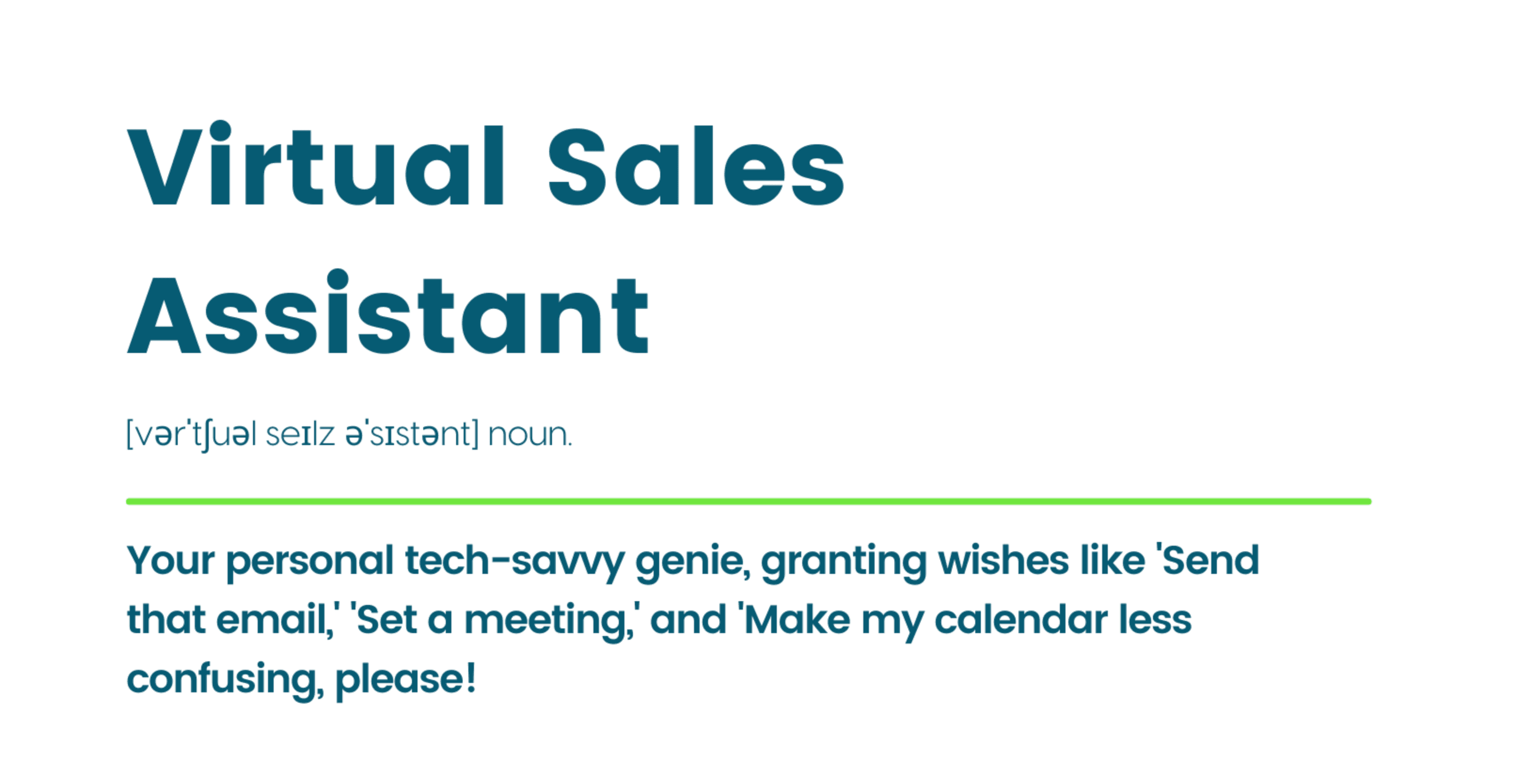AI-Powered Sales: How Virtual Sales Assistants Can Boost Your Sales Team

Lawrence Liu
9/18/2024

AI-Powered Sales: How Virtual Sales Assistants Can Revolutionize Your Sales Team
In today's highly competitive business environment, sales teams face unprecedented pressure and challenges. With the rapid development of artificial intelligence (AI) technology, virtual sales assistants are becoming a key tool for enhancing sales efficiency and effectiveness. According to Gartner's latest research, 75% of B2B sales organizations will increase the use of AI-guided selling technologies by 2025. This article will delve into the concept and functions of virtual sales assistants and how to effectively integrate them into your sales strategy to maintain a competitive edge in the digital age.
1. Virtual Sales Assistants: Game Changers in the Sales World
In recent years, we have witnessed the widespread application of AI technology in various fields, and the sales industry is no exception. The emergence of virtual sales assistants marks a new era of sales process automation and intelligence. According to Salesforce data, sales teams using AI have seen an average productivity increase of 34%. These AI-based tools not only handle tedious daily tasks but also provide in-depth data analysis and personalized sales advice, greatly enhancing the capabilities of sales teams.
The above image showcases the core functions and main advantages of virtual sales assistants. From automated customer communication to providing data-driven sales strategies, virtual sales assistants are reshaping every aspect of the sales process.
2. What is a Virtual Sales Assistant?
A virtual sales assistant is an AI-based software tool designed to help salespeople complete various tasks, improve work efficiency, and boost sales performance. It can understand and process natural language, analyze large amounts of data, and provide recommendations based on specific situations. Virtual sales assistants are like digital members of the sales team, working tirelessly 24/7 to provide personalized support for each salesperson.
3. Core Functions of Virtual Sales Assistants
3.1 Automated Customer Communication
Virtual sales assistants can automatically handle a large volume of customer inquiries and initial communications. They can:
- Answer common questions
- Schedule meetings and follow-ups
- Send personalized emails and messages
- Interact with potential customers on social media
This automation not only improves response times but also allows salespeople to focus more on high-value sales activities. In fact, McKinsey's research shows that by using AI assistants, salespeople can shift up to 30% of their time from administrative tasks to direct customer interactions.
3.2 Sales Data Analysis
AI-driven virtual assistants can quickly process and analyze large amounts of sales data, providing valuable insights:
- Identify sales trends and patterns
- Predict sales outcomes
- Analyze customer behavior and preferences
- Generate detailed sales reports and forecasts
These in-depth data analyses help sales teams make more informed decisions and develop more effective sales strategies. According to an Accenture report, companies using AI for sales forecasting have improved their prediction accuracy by over 40%.
3.3 Personalized Sales Advice
Based on in-depth analysis of customer data, virtual sales assistants can provide personalized recommendations for each sales opportunity:
- Recommend the most suitable products or services
- Suggest the best contact timing
- Propose effective sales scripts and strategies
- Alert to potentially churning customers
This personalized advice greatly improves the targeting and success rate of sales. A Harvard Business Review study shows that companies using AI-driven personalized recommendations have seen an average increase of 20% in their sales conversion rates.
4. Benefits of Integrating Virtual Sales Assistants
The above chart clearly shows the comparison of sales efficiency before and after using virtual sales assistants. We can see that teams using virtual sales assistants have achieved significant improvements across all key indicators.
4.1 Increase Sales Efficiency
By automating routine tasks and providing real-time support, virtual sales assistants can significantly improve the work efficiency of sales teams. Salespeople can spend more time building customer relationships and closing deals, rather than being bogged down by daily administrative tasks. According to Forrester's research, companies using AI sales assistants have seen an average productivity increase of 27% among their salespeople.
4.2 Improve Customer Experience
Virtual assistants can provide quick and accurate responses, ensuring that customer inquiries are handled promptly. Personalized communication and recommendations also help improve customer satisfaction and loyalty. A survey conducted by Zendesk shows that 90% of consumers say that quick responses have a significant impact on their purchasing decisions.
The above chart shows the significant improvement in customer satisfaction after using virtual sales assistants. We can see that customer satisfaction has improved noticeably across multiple key indicators.
4.3 Data-Driven Decision Making
By providing in-depth data analysis and predictions, virtual sales assistants enable sales teams and management to make more informed and strategic decisions. This not only helps improve sales performance but also optimizes overall sales strategies. Research by MIT Sloan Management Review shows that data-driven organizations are 31% more likely to create sustainable financial value than their peers.
5. How to Choose a Virtual Sales Assistant Suitable for Your Business
Choosing the right virtual sales assistant requires considering the following factors:
- Integration with existing systems: Ensure that the virtual assistant can seamlessly integrate with your existing CRM and other sales tools.
- Customization capability: Look for solutions that can be customized according to your specific business needs.
- Learning ability: Choose an assistant with strong machine learning capabilities that can continuously improve its performance over time.
- User-friendliness: Ensure that the sales team can easily adapt to and use this new tool.
- Data security: Consider the data security features of the solution to ensure the safety of customer information.
- Scalability: Choose a solution that can scale as your business grows.
The above flowchart shows the detailed process from selecting to fully integrating a virtual sales assistant. Following these steps can ensure that your team transitions smoothly to an AI-driven sales model.
6. Best Practices for Implementing Virtual Sales Assistants
- Gradual implementation: Introduce the virtual assistant in phases, starting with a small-scale pilot and then gradually expanding.
- Comprehensive training: Provide thorough training for the sales team to ensure they can fully utilize the virtual assistant's functions.
- Continuous optimization: Regularly collect feedback and continuously optimize the virtual assistant's functions and performance.
- Human-machine collaboration: Emphasize that the virtual assistant is a complement to human salespeople, not a replacement.
- Data quality management: Ensure the quality of data input into the system, as this directly affects the effectiveness of the virtual assistant.
- Set clear KPIs: Establish clear performance indicators to measure the effectiveness of the virtual assistant.
7. Case Studies: Companies Successfully Using Virtual Sales Assistants
-
Salesforce: Through its Einstein AI platform, Salesforce has successfully integrated AI into its CRM system. This allows sales teams to obtain more accurate sales forecasts, personalized customer interaction suggestions, and automated task management. The result is a 15% reduction in sales cycles and a 30% increase in closure rates.
-
Zoom: Zoom uses AI-driven virtual assistants to optimize its sales process. This assistant can automatically transcribe sales calls, extract key information, and provide actionable insights. This not only improved the efficiency of the sales team but also enhanced customer experience and satisfaction. Zoom reported that after using the AI assistant, its sales team's productivity increased by 20%, and customer satisfaction improved by 15%.
-
HubSpot: HubSpot's AI sales assistant helps sales teams automate many repetitive tasks, such as data entry and meeting scheduling. It also provides intelligent contact timing suggestions and personalized email templates. HubSpot's data shows that sales teams using the AI assistant obtained 50% more qualified sales leads than teams not using it.
8. Future Trends: Application of AI Employees in the Sales Field
The above chart shows the growth forecast for the virtual sales assistant market in the coming years. We can see that this market is experiencing explosive growth and is expected to reach a scale of tens of billions of dollars by 2028.
Looking ahead, we can foresee that the application of AI in the sales field will become more extensive and in-depth:
-
Emotional AI: AI systems capable of recognizing and responding to customer emotions will make sales interactions more personalized and effective. According to Gartner's prediction, 10% of personal devices will have emotional AI capabilities by 2026.
-
Predictive Sales: AI will be able to more accurately predict which potential customers are most likely to convert and when. IDC's research indicates that 75% of enterprises will use AI for predictive sales by 2025.
-
Autonomous Negotiation AI: Future AI may have the ability to conduct preliminary sales negotiations, further freeing up time for human salespeople. Researchers at MIT are developing AI systems capable of complex negotiations, which could become a reality in the next 5-10 years.
-
Augmented Reality (AR) Integration: Combining AR technology with virtual sales assistants creates new possibilities for remote product demonstrations and customer interactions. According to Statista's forecast, the AR market size will reach $50 billion by 2024, with sales and marketing being one of the main application areas.
-
Cross-platform Integration: Virtual sales assistants will more seamlessly integrate various communication and social platforms, providing comprehensive customer interaction support. Forrester predicts that 60% of B2B sales interactions will be conducted through digital channels by 2025.
Conclusion
Virtual sales assistants represent the future of sales technology. By injecting the power of AI into the sales process, businesses can significantly improve efficiency, enhance customer experience, and ultimately boost sales performance. While implementing this technology requires initial investment and change, the long-term returns are enormous.
According to Deloitte's research, companies adopting AI technology generate an average of 17% more revenue than those that haven't. As technology continues to advance, businesses that can effectively leverage AI empowerment will gain a competitive advantage in an increasingly competitive market.
Now is the best time for businesses to consider how to integrate virtual sales assistants into their sales strategies to ensure competitiveness in the digital sales era. By embracing this revolutionary technology, your sales team will be able to work smarter and more efficiently, provide better service to customers, and ultimately drive business growth.
Don't fall behind your competitors, start exploring the endless possibilities that virtual sales assistants can bring to your business today!
Related Posts

AI-Driven Personalized Marketing: Redefining the New Paradigm of Customer Experience
Dive deep into how AI marketing employees are revolutionizing personalized marketing strategies. From precise customer profile construction to dynamic content generation, understand how AI creates unprecedented personalized customer experiences.

AI Marketing Employee: A New Paradigm for Data-Driven Decision Making
Explore how AI marketing employees are revolutionizing data processing and analysis. Learn how this groundbreaking technology provides real-time insights, optimizes decision-making processes, and drives precision in marketing strategies.

AI Marketing Employee: The Game Changer in Digital Marketing
Explore how AI marketing employees are revolutionizing the digital marketing landscape. Learn how this groundbreaking technology enhances efficiency, precision, and creates unprecedented value for brands.




